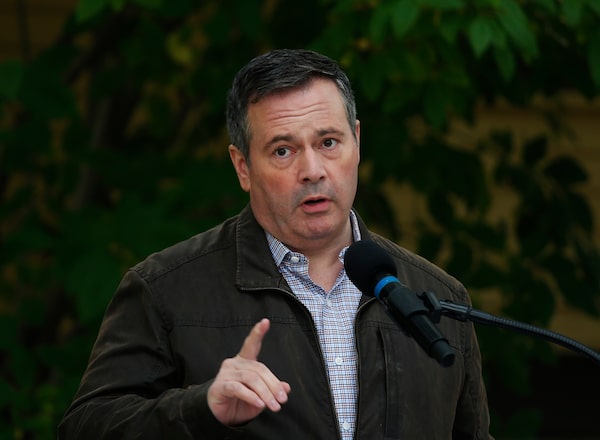
Alberta Premier Jason Kenney at a news conference in Calgary on Sept. 15, 2020. COVID-19 vaccinations in Alberta have officially begun and Kenney says he won’t tolerate queue jumping.Todd Korol/The Canadian Press
COVID-19 vaccinations in Alberta have officially begun and, as lineups form in the coming days, Premier Jason Kenney says he won’t tolerate queue jumping.
“At our very first cabinet discussion on this I said, ‘We must build an absolute wall around the vaccination program to ensure there’s no political pressure of any kind on who gets vaccinated when,’ ” Mr. Kenney said Tuesday, moments after two health care workers became the first Albertans to receive the vaccine.
“I don’t want [legislature members] from I don’t care what party saying that the nursing home in their constituency or a constituent’s mom needs to go first.
“We have to have this run impartially, objectively by expert officials. And I have confidence in them.”
Alberta has some recent experience with medical queue jumping.
In 2009, it was discovered that players and families of the Calgary Flames National Hockey League team had somehow managed to jump ahead of others to get doses of the scarce H1N1 vaccine.
In 2013, a provincial inquiry into health care queue-jumping found isolated instances of misbehaviour. It urged more action to reduce surgical wait times, noting that long waits for care were an incentive for insiders to butt ahead in line.
Alberta joins a growing list of provinces that have administered the Pfizer-BioNTech vaccine. Ontario and Quebec started Monday.
The first COVID-19 vaccine injections in Canada were administered in Toronto and Quebec City within half an hour of each other on Monday. Personal support worker Anita Quidangen was the first in Ontario to get the shot.
The Globe and Mail
About 3,900 doses arrived in Alberta on Monday night and are to be administered to high-risk front-line health workers in the coming days.
On Tuesday, Sahra Kaahiye, a respiratory therapist at Edmonton’s Glenrose Rehabilitation Hospital, and Tanya Harvey, an intensive-care nurse at the Foothills Medical Centre Cell in Calgary, were the first to get their shots.
Another 25,000 doses of the Pfizer vaccine are expected to arrive next week, again to front-line health workers. More doses are to arrive in the months to come.
Alberta already announced a three-phase plan to distribute the vaccine. The first phase, from now until about March, is to focus on 10 per cent of Alberta’s population representing those most at risk – front-line health workers, long-term care residents and the elderly.
The priority group for the second phase, which is to ramp up through the spring and vaccinate a third of the province, has yet to be determined. The final 60 per cent of Albertans are to get their vaccinations starting in the summer.
Who gets priority in the second phase is the responsibility of an interdepartmental team headed up by senior civil servant Paul Wynnyk.
Mr. Kenney said he’s leaving those decisions to Mr. Wynnyk, but expects the next phase of recipients could be those on the front lines who deliver critical, non-medical services, such as those who operate the electricity grid.
“That’s the kind of thing you can’t risk going down,” he said. “[But] we’ll leave that determination to the experts.”
Alberta has been dealing with the pandemic on multiple fronts. Last week, Mr. Kenney introduced stricter health rules to reduce sharply rising case counts that have registered well over a thousand new cases a day for about a month.
Some businesses from movie theatres to hair salons have closed, while restaurants can only do takeout and retailers are limited to 15-per-cent capacity.
On Tuesday, the province reported 1,341 new COVID cases, with 742 people in hospital and 137 of them in intensive care. There are 20,649 active cases. So far, 744 people have died.
Mr. Kenney said some urban regions have been hit particularly hard by the novel coronavirus, including north Edmonton and northeast Calgary, where families tend to live in high-density housing and may not be able to physically distance properly.
Mr. Kenney announced new supports for those areas, which will include helping residents fill out online applications for aid and free short-term stays in motels.
Sign up for the Coronavirus Update newsletter to read the day’s essential coronavirus news, features and explainers written by Globe reporters and editors.